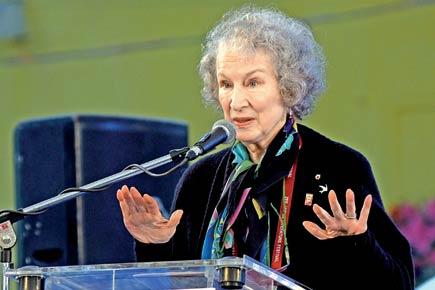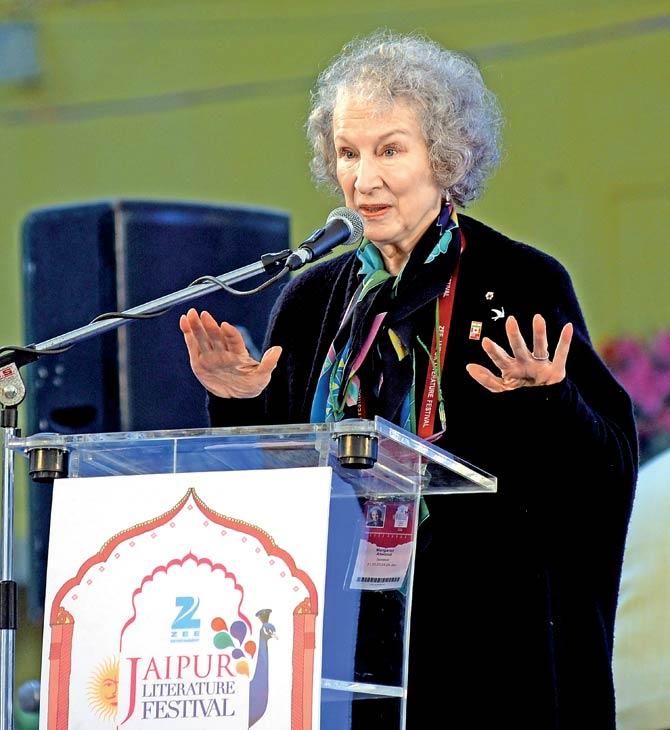For this columnist, it was at the Jaipur lit fest that book signings took on a special meaning, whether the book was Rushdie’s or her own


ADVERTISEMENT

Canadian novelist Margaret Atwood at this year’s Jaipur Literature Festival. Pic/AFP
The highlight of my trip was Rushdie signing my second-hand copy of The Moor’s Last Sigh that my sister gifted me for Christmas. We’d bought it together at the Fort pavement famously frequented for such collectibles. Considering how little money we had, she did some heavy-duty bargaining, and to attest to it, inscribed the spiel we used most in gold ink, “Humare paas do sau rupai kahan se aayenge?” On the top right corner, she wrote the date, 22/12/2004. I noticed Rushdie glancing over the almost illegible dedication. Then I opened my second-hand copy of Shame so he could sign it. It was dated 2003, and had also been sourced from the Fort pavement. “My first Rushdie purchase,” I’d written on the title page. Rushdie noticed. He made an arrow pointing to it while simultaneously crossing out the blue-ink stamp that read “Technical Library, Naval Dockyard”.
The next day Jerry Pinto introduced me to Suketu Mehta, whose Maximum City had jolted my writerly system. After a very brief conversation I gingerly asked if he would consent to signing my paperback edition. He graciously agreed, and — as if commemorating that ephemeral moment where we instantly ‘connected’ on the common ground of adultery (I’d told him how much I loved that line from his book, “I am an adulterous resident: when I am in one city, I am dreaming of the other”) — he wrote, in capital letters: “FOR ROSALYN, FELLOW CITIZEN OF THE COUNTRY OF LONGING”.
Since then, the act of an author signing my usually dog-eared, if not new, copy of their book has assumed the significance of a ritual. These autographed copies are among my most prized objects, and they keep increasing in number, thanks to festivals like JLF. So obviously, when my first book, A Handbook For My Lover was released in December last year, it was only natural that I chose to maintain the sanctity of the gesture. Little did I know then how this ceremonious practice could also engender lessons in humility.
I still remember the first copy I signed; it was an advance copy and didn’t have the red-velvet-cake-coloured edges characteristic of the hardback edition. It was addressed to someone miles away in Australia, Meelee Soorkia, the editor at Hardie Grant who was overseeing the publication of Walking Towards Ourselves, an anthology of writing by Indian women edited by Catriona Mitchell, who had bought the copy and had requested me to sign it first for Meelee because, despite logical evidence to the contrary, she never once doubted my ability to deliver the essay she so desired from me. Since then, I’ve made it a point to sign every copy with my Schaeffer ink pen. I carry my bottle of black ink with me at all times, to preserve the continuity. It’s part of my signature; this return to old technology, a symbol of the epistolary tradition that my memoir harks back to.
To my dismay, I had no reason to carry my silver Schaeffer during my visit to the last edition of JLF. I hadn’t been invited to participate in any capacity, and the good Catholic in me made great excuses on behalf of the organisers. My book was perhaps not literary enough, or perhaps seemed too sleazy. It didn’t matter.
I still went, not really to attend sessions or network, but because I’d been invited to a dinner in honour of Margaret Atwood, a writer on whose work I’d cut my feminist teeth. Even though I carried my copies of her books to Jaipur, I didn’t take them along when I went to meet her. This is what I told myself, and my friends: “You don’t need a DNA test when you know for sure that your mother is your mother.” When I went up to her, all I did was give her a postcard inspired by my book. Then I politely left.
About a week later, as I was waiting to board an Air India flight to Kolkata, I saw her waltzing past the escalator; her halo of hair an instant giveaway. I nudged at my partner, “That’s her!” I said. “Why don’t you give her a copy of your book?” he asked. “I don’t have one handy,” I said, “They’re all sealed in the box.” He got up and started to fidget with the tape and finally handed me a copy. “Go find her,” he said. I ran towards the next two gates. She was nowhere in sight...
(To be continued)
Deliberating on the life and times of Everywoman, Rosalyn D’Mello is a reputed art critic and the author of A Handbook For My Lover. She tweets @RosaParx. Send your feedback to mailbag@mid-day.com
 Subscribe today by clicking the link and stay updated with the latest news!" Click here!
Subscribe today by clicking the link and stay updated with the latest news!" Click here!






